Letters from Arthur Seaforth Blackburn to his family, 1941 - Part 21
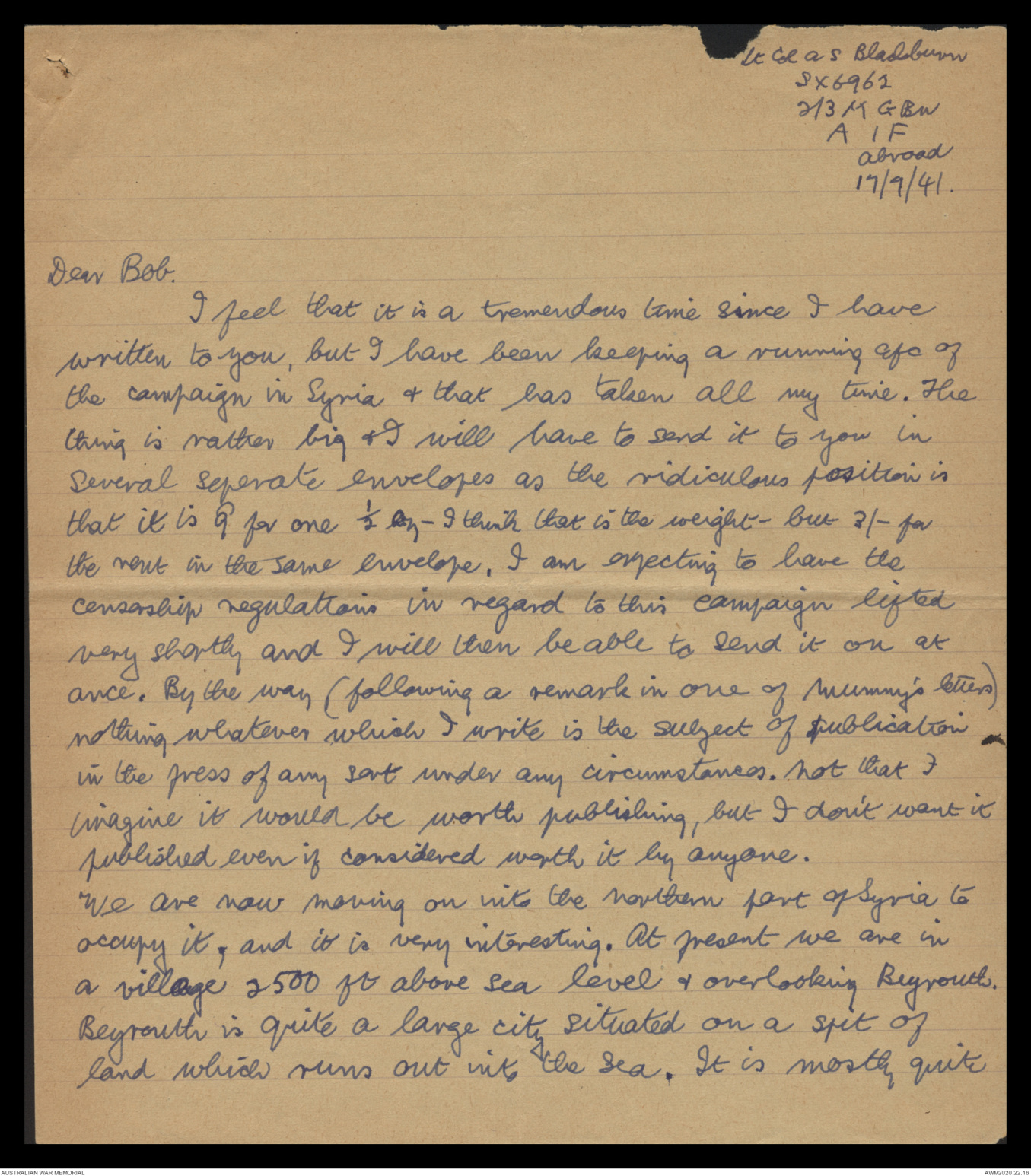
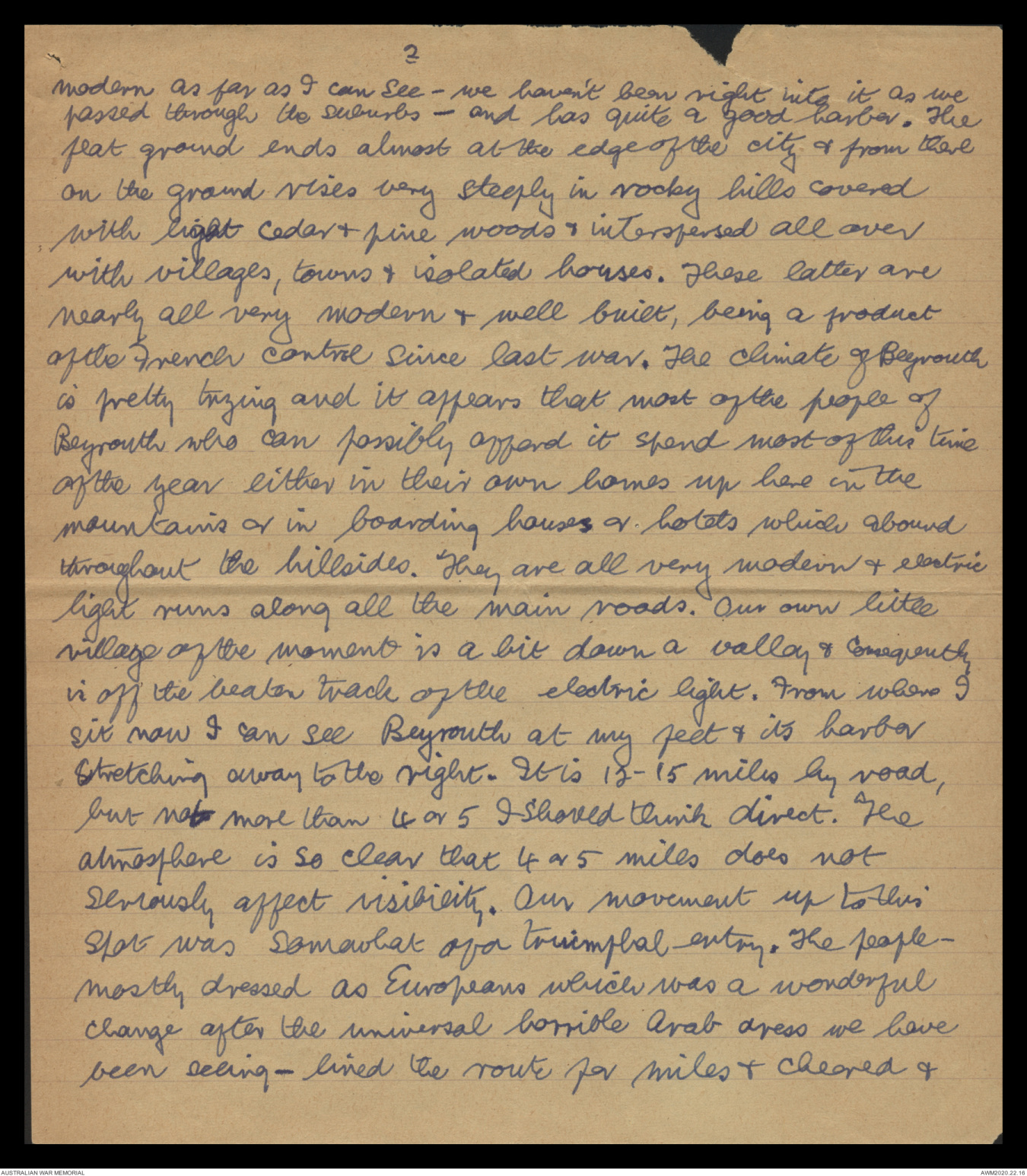
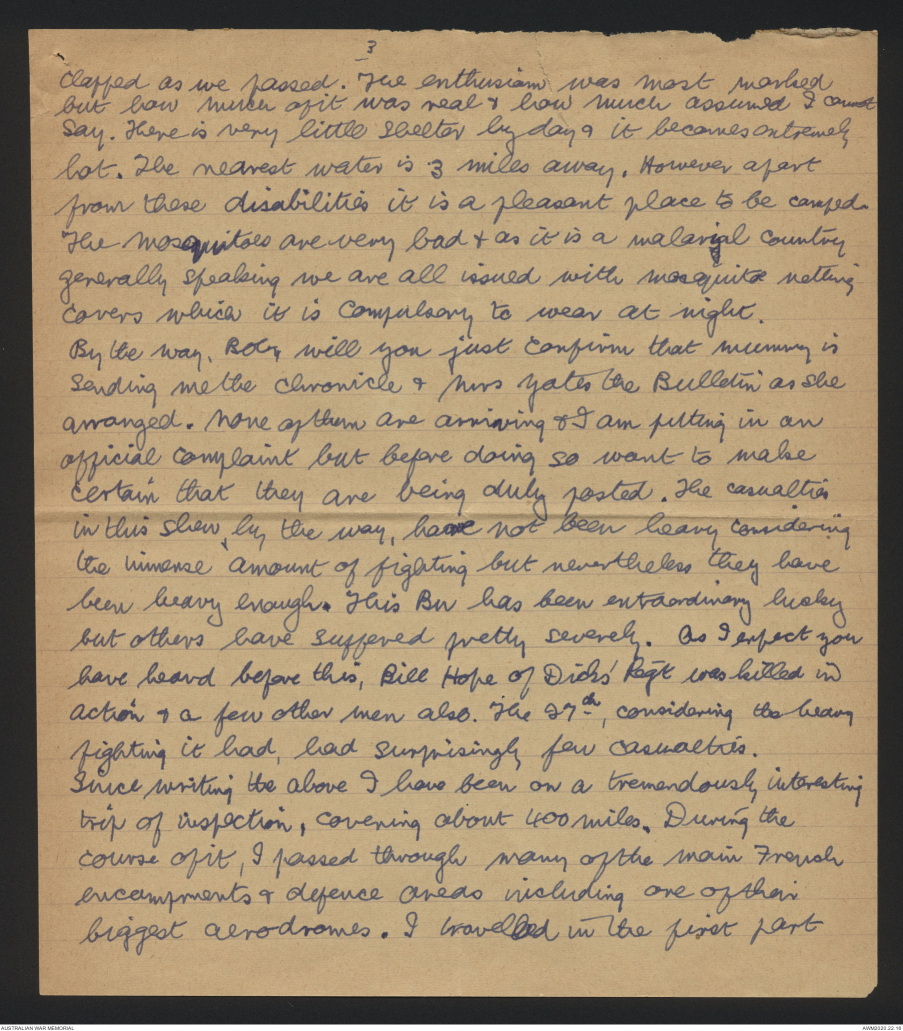
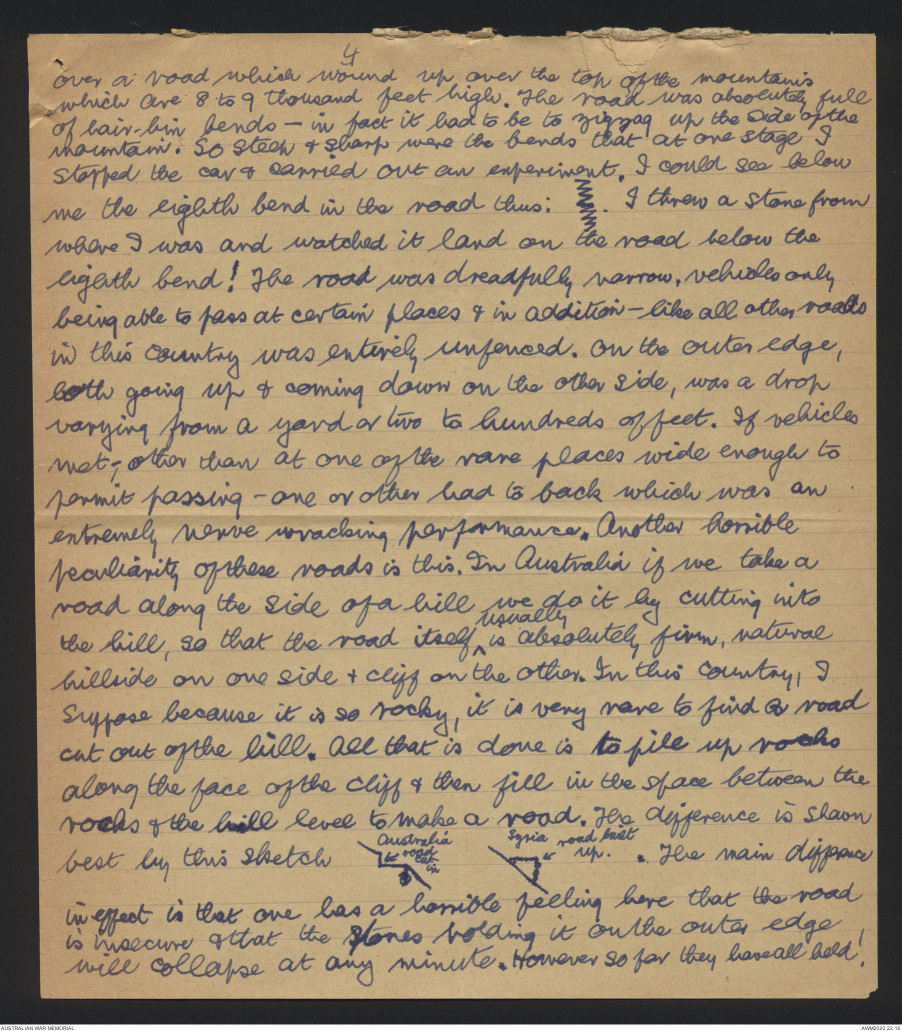
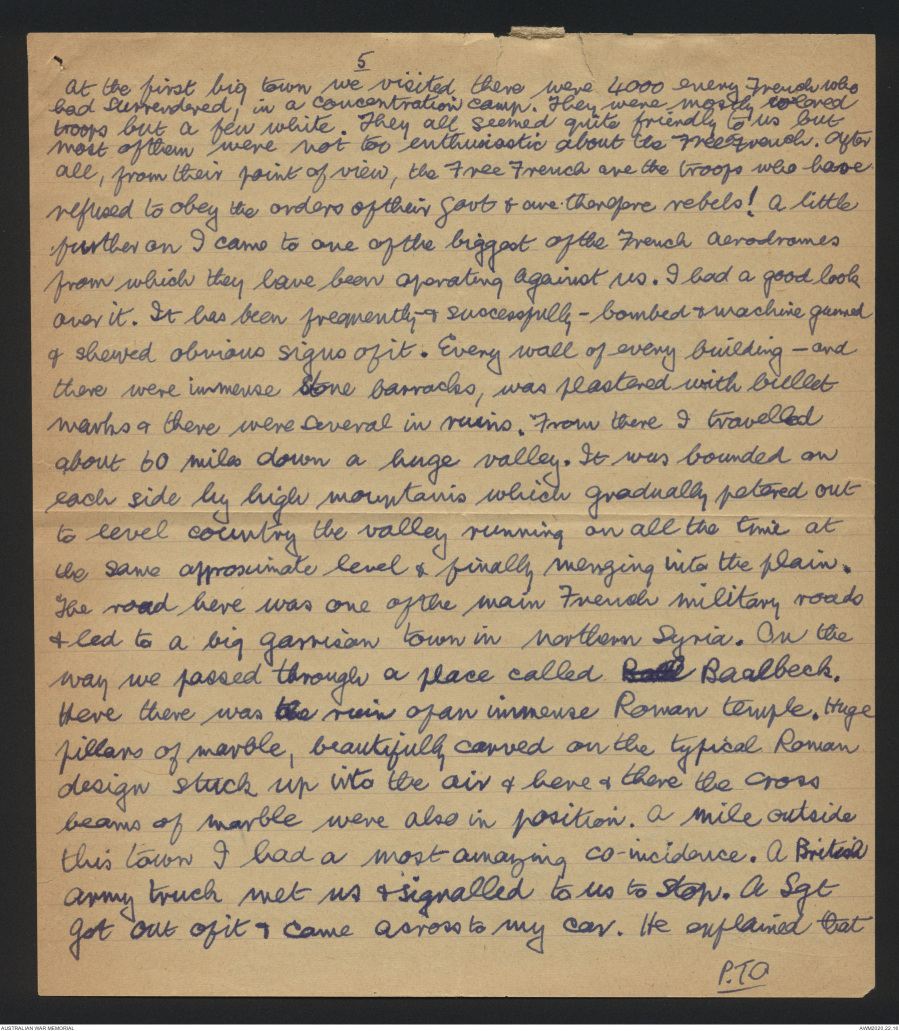
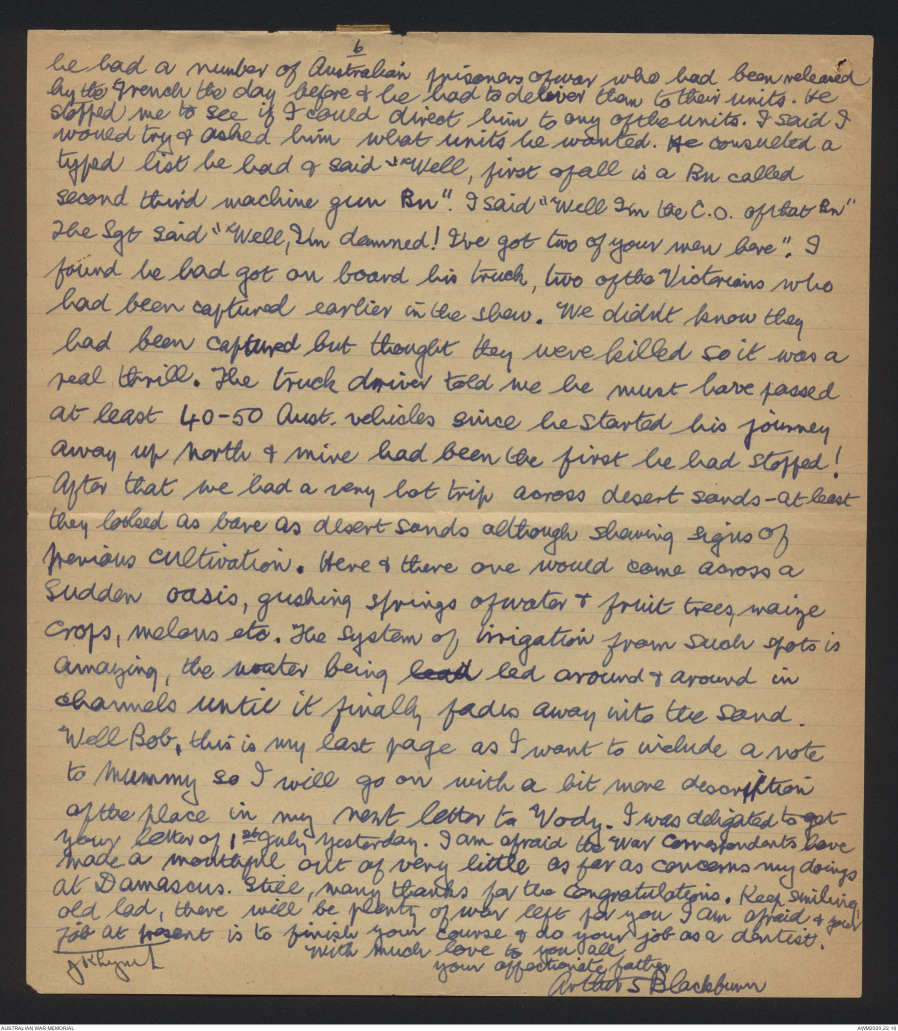
Lt Col A S Blackburn
SX 6962
2/3 M G Bn
AIF
Abroad
17/9/41
Dear Bob.
I feel that it is a tremendous time since I have
written to you, but I have been keeping a running a/c of
the campaign in Syria & that has taken all my time. The
thing is rather big & I will have to send it to you in
several seperate envelopes as the ridiculous position is
that it is 9d for one ½ oz - I think that is the weight- but 3/- for
the next in the same envelope. I am expecting to have the
censorship regulations in regard to this campaign lifted
very shortly and I will then be able to send it on at
once. By the way (following a remark in one of mummy's letters)
nothing whatever which I write is the subject of publication
in the press of any sort under any circumstances. Not that I
imagine it would be worth publishing, but I don't want it
published even if considered worth it by anyone.
We are now moving on into the northern part of Syria to
occupy it, and it is very interesting. At present we are in
a village 2500 ft above sea level & overlooking Beyrouth.
Beyrouth is quite a large city situated on a spit of
land which runs out into the Sea. It is mostly quite
2/
modern as far as I can see - we haven't been right into it as we
passed through the suburbs - and has quite a good harbor. The
flat ground ends almost at the edge of the city & from there
on the ground rises very steeply in rocky hills covered
with light cedar & pine woods & interspersed all over
with villages, towns & isolated houses. These latter are
nearly all very modern & well built, being a product
of the French control since last war. The climate of Beyrouth
is pretty trying and it appears that most of the people of
Beyrouth who can possibly afford it spend most of this time
of the year either in their own homes up here in the
mountains or in boarding houses & hotels which abound
throughout the hillsides. They are all very modern & electric
light runs along all the main roads. Our own little
village of the moment is a bit down a valley & consequently
is off the beaten track of the electric light. From where I
sit now I can see Beyrouth at my feet & its harbor
stretching away to the right. It is 12-15 miles by road,
but not more than 4 or 5 I should think direct. The
atmosphere is so clear that 4 or 5 miles does not
seriously affect visibility. Our movement up to this
spot was somewhat of a triumphal entry. The people-
mostly dressed as Europeans which was a wonderful
change after the universal horrible Arab dress we have
been seeing- lined the route for miles & cheered &
3/
clapped as we passed. The enthusiasm was most marked
but how much of it was real & how much assumed I cannot
say. There is very little shelter by day & it becomes extremely
hot. The nearest water is 3 miles away. However apart
from these disabilities it is a pleasant place to be camped.
The mosquitoes are very bad & as it is a malarial country
generally speaking we are all issued with mosquito netting
covers which it is compulsory to wear at night.
By the way, Bob, will you just confirm that mummy is
sending me the chronicle & Mrs Yates the Bulletin as she
arranged. None of them are arriving & I am putting in an
official complaint but before doing so want to make
certain that they are being duly posted. The casualties
in this show, by the way, have not been heavy considering
the immense amount of fighting but nevertheless they have
been heavy enough. This Bn has been extraordinary lucky
but others have suffered pretty severely. As I expect you
have heard before this, Bill Hope of Dick's Regt. was killed in
action & a few other men also. The 27th, considering the heavy
fighting it had, had surprisingly few casualties.
Since writing the above I have been on a tremendously interesting
trip of inspection, covering about 400 miles. During the
course of it, I passed through many of the main French
encampments & defence areas including one of their
biggest aerodromes. I travelled in the first part
4/
over a road which wound up over the top of the mountains
which are 8 to 9 thousand feet high. The road was absolutely full
of hair-bin bends - in fact it had to be to zigzag up the side of the
mountain. So steep & sharp were the bends that at one stage I
stopped the car & carried out an experiment. I could see below
me the eighth bend in the road thus: I threw a stone from
where I was and watched it land on the road below the
eighth bend! The road was dreadfully narrow, vehicles only
being able to pass at certain places & in addition - like all other roads
in this country was entirely unfenced. On the outer edge,
both going up & coming down on the other side, was a drop
varying from a yard or two to hundreds of feet. If vehicles
met - other than at one of the rare places wide enough to
permit passing - one or other had to back which was an
extremely nerve wracking performance. Another horrible
peculiarity of these roads is this. In Australia if we take a
road along the side of a hill we do it by cutting into
the hill, so that the road itself usually is absolutely firm, natural
hillside on one side & cliff on the other. In this country, I
suppose because it is so rocky, it is very rare to find a road
cut out of the hill. All that is done is to pile up rocks
along the face of the cliff & then fill in the space between the
rocks & the hill level to make a road. The difference is shown
best by this sketch (Australia road cut in) (Syria road built up). The main difference
in effect is that one has a horrible feeling here that the road
is insecure & that the stones holding it on the outer edge
will collapse at any minute. However so far they have all held!
5/
At the first big town we visited, there were 4000 enemy French who
had surrendered, in a concentration camp. They were mostly colored
troops but a few white. They all seemed quite friendly to us but
most of them were not so enthusiastic about the Free French. After
all, from their point of view, the Free French are the troops who have
refused to obey the orders of their govt. & are therefore rebels! A little
further on I came to one of the biggest of the French aerodromes
from which they have been operating against us. I had a good look
over it. It has been frequently & successfully - bombed & machine gunned
& showed obvious signs of it. Every wall of every building - and
there were immense stone barracks, was plastered with bullet
marks & there were several in ruins. From there I travelled
about 60 miles down a huge valley. It was bounded on
each side by high mountains which gradually petered out
to level country the valley running on all the time at
the same approximate level & finally merging into the plain.
The road here was one of the main French military roads
& led to a big garrison town in northern Syria. On the
way we passed through a place called Ball Baalbeck.
Here there was the ruin of an immense Roman temple. Huge
pillars of marble, beautifully carved on the typical Roman
design stuck up into the air & here & there the cross
beams of marble were also in position. A mile outside
this town I had a most amazing co-incidence. A British
army truck met us & signalled to us to stop. A Sgt
got out of it & came across to my car. He explained that
P.T.O
6/
he had a number of Australian prisoners of war who had been released
by the French the day before & he had to deliver them to their units. He
stopped me to see if I could direct him to any of the units. I said I
would try & asked him what units he wanted. He consulted a
typed list he had & said "Well, First of all is a Bn called
second third machine gun Bn". I said "Well I'm the C.O. of that Bn"
The Sgt said "Well I'm damned! I've got two of your men here". I
found he had got on board his truck, two of the Victorians who
had been captured earlier in the show. We didn't know they
had been captured but thought they were killed so it was a
real thrill. The truck driver told me he must have passed
at least 40-50 Aust. vehicles since he started his journey
away up north & mine had been the first he had stopped!
After that we had a very hot trip across desert sands - at least
they looked as bare as desert sands although showing signs of
previous cultivation. Here & there one would come across a
sudden oasis, gushing springs of water & fruit trees, maize
crops, melons etc. The system of irrigation from such spots is
amazing, the water being lead led around & around in
channels until it finally fades away into the sand.
Well Bob, this is my last page as I want to include a note
to Mummy so I will go on with a bit more description
of the place in my next letter to Wody. I was delighted to get
your letter of 1st July yesterday. I am afraid the war correspondants have
made a mouthful out of very little as far as concerns my doings
at Damascus. Still, many thanks for the congratulations. Keep smiling,
old lad, there will be plenty of war left for you I am afraid & your
job at present is to finish your course & do your job as a dentist.
With much love to you all
Your affectionate father
Arthur S Blackburn
 Jacqueline Kennedy
Jacqueline KennedyThis transcription item is now locked to you for editing. To release the lock either Save your changes or Cancel.
This lock will be automatically released after 60 minutes of inactivity.